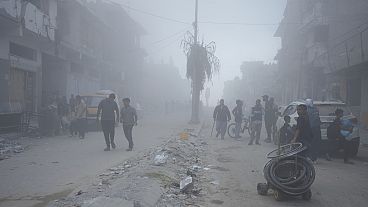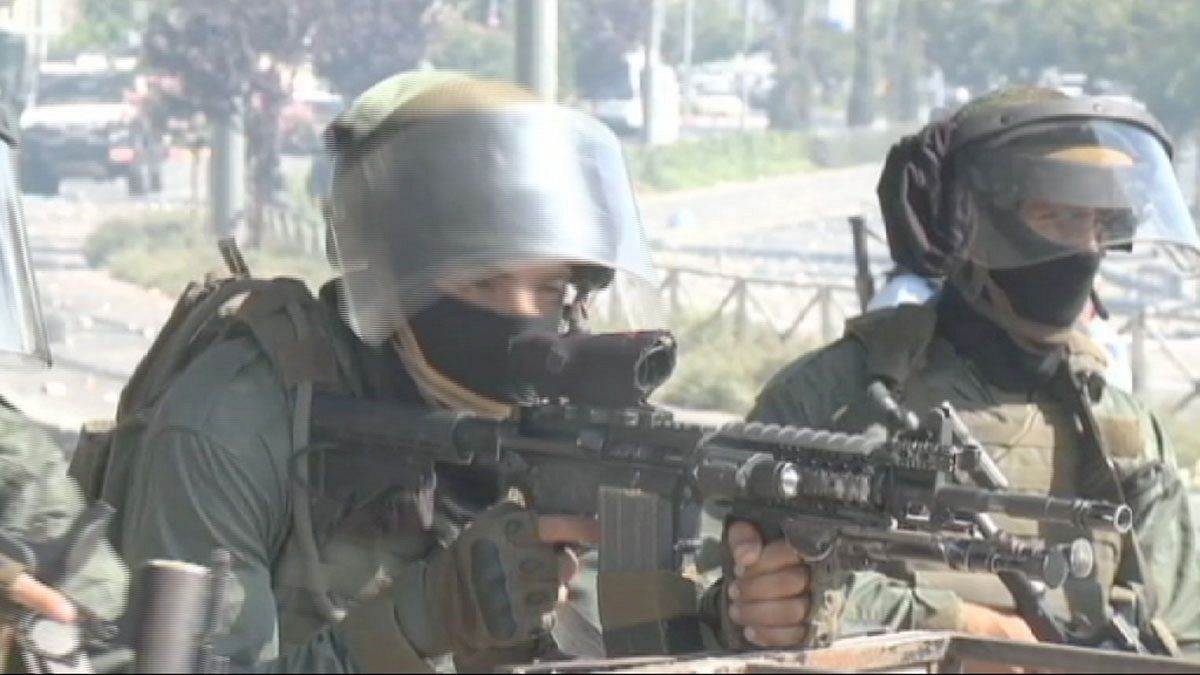The recent cycle of violence between Israel and the Palestinians has shown little sign of slowing down. Neither has the outpouring of grief.
Israelis have been angered by the deaths of the three Jewish teens who went missing in the occupied West Bank nearly a month ago. For their part, Palestinians have been up in arms over the murder of a teenager burnt to death in a Jerusalem forest last week.
Both incidents have given succour to extremists and triggered days of street clashes. Violence that has spread to Arab towns and villages across Israel.
Israel claims the Jewish youths were killed by Hamas militants, an allegation the Islamist group has neither accepted nor denied. The Palestinians have accused far-right Jewish settlers for killing the Palestinian teenager.
It has all led to a surge in violence with Israel’s prime minister under pressure from all sides in his country to react.
Far-right members of Benjamin Netanyahu’s cabinet have pushed for a stronger response to the rocket fire that’s wreaking havoc in Israel’s south.
Although the prime minister pledged “to do whatever is necessary” to restore quiet to southern Israeli communities he also cautioned against any rush toward wider confrontation with Hamas.
Mark Regev, spokesman for Israel’s prime minister told euronews: “Hamas is a terrorist organisation that must be defeated. Now Israel, in our relationship with Gaza, we would keep the border quiet. The problem is Hamas does not allow that to happen. Over the last three weeks there have been around 150 rockets missiles and mortar shell from Gaza into Israel. So obviously we have to act to protect our people”
Israeli air strikes against so-called “terror sites and concealed rocket launchers” in the Gaza Strip have prompted calls for reprisals from Hamas.
It is threatening to strike back, saying Israel will “pay the price” for committing a “grave escalation” in violence
Hamas spokesman Mushir Al Masri Hamas said: “The Palestinian people support resistance in the face of the Israeli threat, and any war on Gaza will open the gates of hell in the face of the occupiers. And the resistance (Hamas), will not sit by idly.”
Although US-backed peace talks collapsed in April, many Israelis say this is a chance to break new ground by showing restraint and more understanding.
But the calls for calm risk falling on deaf ears with relations between Israel and Palestinians at their lowest point for months. Hopes for reconciliation it appears have taken a back seat to retaliations and steps to boost security.
Euronews spoke to Freddy Eytan, a senior researcher at the Jerusalem Center for Public Affairs to get an Israeli perspective on events. Etyan served in the Israeli army from 1965 to 1972 and fought in battles during the Six Day War in the Golan Heights and Northern West Bank. The Jerusalem Center for Public Affairs is a conservative think tank headed by a former Israeli ambassador to the UN.
Luis Carballo, euronews:
Mr Netanyahu has a dilemma: should he attack Hamas or not?. Which do you think is most likely to happen?
Freddy Eytan:
Listen, Benjamin Netanyahu is in his third term as prime minister so he has experience and he believes that we must have a deterrent and the message should act as a deterrent. Netanyahu has a big dilemma because he has a coalition that is quite tough and quite difficult coalition to manage. There’s the far-right with Lieberman, Bennett and others, who are desperate to launch a major operation. But that Netanyahu will not do. But actually there has to be a dissuasive message. We can not allow or tolerate the murder of three teenagers and don’t retaliate. There are retalliations and occasional raids each time there is a missile launch or rocket against Israeli villages. That’s politics, and that has been Netanyahu’s strategy for a long time. So it won’t go any further. Netanyahu is not a warmonger. He didn’t launch aggressive operations against Lebanon or Gaza like Olmert .
euronews:
The Israeli army defines Hamas as an organisation without resources. Is this the truth. Is the organization really dismantled like the Israeli army says?
Freddy Eytan:
Hamas, which you must remember is considered a terrorist group by the international community, Hamas is becoming increasingly isolated because the geopolitical situation has changed. Because there is a new president in Egypt who wants to get rid of the Muslim Brotherhood, and actually Hamas is the same as the Muslim Brotherhood.Hamas is in trouble because it is isolated in the Arab world, even within the Arab world as the Muslim Brotherhood are declining in popularity, but on the other hand we see that Hamas is trying to return to the international scene, especially to the Arab world, and score some positive points. But it has financial difficulties. It can’t pay the 40,000 employees, it can’t give them their salaries and that’s a problem too.On the one hand Hamas, which is in a difficult situation, cannot control all of its troops: there’s the Islamic Jihad, the Ezzedime El Qassam Brigades, and other factions that are trying to break the truce. Because Hamas wants the truce, a long-term truce, a year and a half, two years and it doesn’t want to close the door to the Israelis. What is happening is that we are in a situation where Hamas is not capable of launching major operations because it knows that Israel will retaliate in a devastating way against Hamas and perhaps with a large-scale operation, it is a possibility, it’s something that could happen, but on the other hand Hamas wants to lead, it wants to prove that it is stronger than Fatah.
euronews:
Do you see signs of a Third Intifada happening? Is this just a temporary explosion of anger or something more serious?
Freddy Eytan:
The first intifada broke out after a car accident. It was in December 88 [sic] in Gaza. So today there is no control over these things. We can not know what will happen tomorrow in the Middle East. Everything is volatile, everything changes and so one must be careful.












